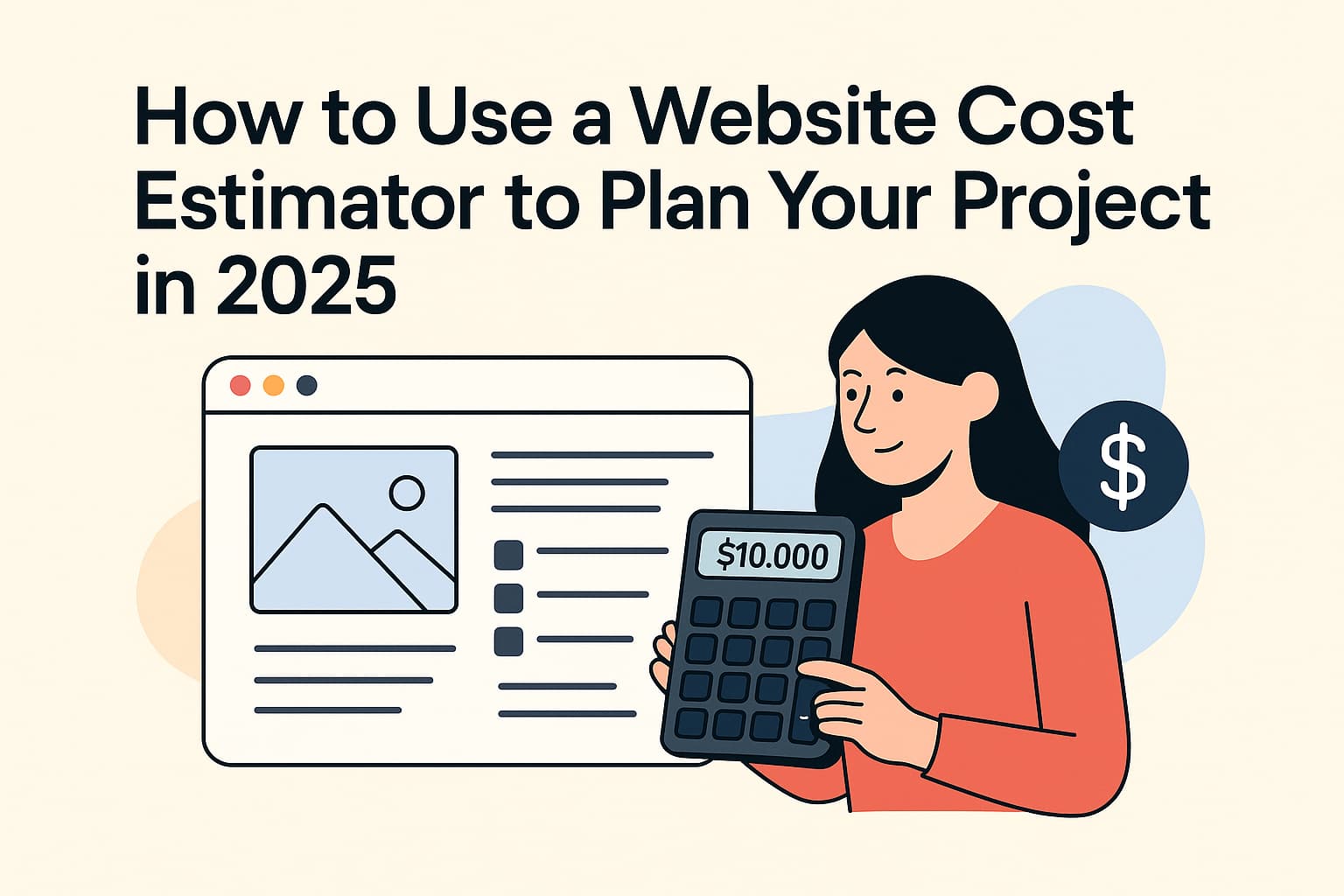How to use a website cost estimator to plan your project in 2025?
Website cost estimator, website cost calculator, AI, RAG, 2025Estimating how much a website will cost is one of the biggest challenges for startups, project managers, and self-employed alike. Without clear benchmarks or structured guidance, it's easy to overspend—or worse, underbudget and stall mid-project. That's where a website cost estimator comes in. These tools simplify the process, offering a fast and transparent way to evaluate your project's cost.

What is a website cost estimator?
A website cost estimator is an online tool that helps you evaluate the cost of building a website based on multiple parameters: design complexity, number of features, type of content management system (CMS), integrations, deadlines, and more. Unlike generic pricing tables, these estimators tailor the cost to your specific needs and goals. These tools are particularly useful for non-technical users who need a sense of the overall budget before speaking to developers or agencies. ScopeWise, for example, guides users through a 3-step form to describe their project and instantly receives an estimate for design, features, and go-live timeline. This helps users avoid unexpected costs and prepares them to make informed decisions. We'll come back to how ScopeWise works below.
Why use a website estimation tool?
Using these tools offers several benefits:
Clarity: Know exactly what drives up costs and what keeps them low. Instead of vague estimates, you’ll understand how design, functionality, and custom development affect pricing.
Speed: No need to wait for quotes—get instant estimates. This is particularly valuable when you're comparing multiple scenarios or presenting a project to stakeholders.
Better planning: Prioritize features based on your budget. You might realize you can delay some elements to a future version, helping you launch faster.
Transparency: Align expectations with developers or agencies. An estimator makes it easier to communicate your needs and budget.
Enpowerment: You stay in control of your project scope and budget from day one.
How do calculators work?
Most website cost estimators work by guiding users through a set of structured questions. These questions are often grouped into categories such as:
Project type: Showcase site, e-commerce platform, web app, internal tool...
Design: Template-based, customized, or fully bespoke UI/UX.
Features: Blog, user accounts, contact forms, payment processing...
Technology: WordPress, headless CMS, Frameworks or custom-built platforms
Timeline: Do you need it fast, or can it be built over several months?
Based on your answers, the estimator calculates development time, design effort, and associated costs. For example, a site with five pages, basic SEO, and a contact form will have a much lower estimate than a multi-language e-commerce site with real-time inventory tracking and CRM integrations.
Typical website costs in 2025
To help contextualize your estimate, here are average ranges you can expect in 2025:
Simple website: 1,000€/$- 5,000€/$
Corporate site with CMS: 3,000€/$- 10,000€/$
E-commerce platform: 7,000€/$- 12,500€/$
Custom web app (SaaS, platform): 12,000€/$- 100,000€/$
Prices vary depending on your provider (freelancer vs. agency), the country, the depth of features, UI/UX needs, and third-party integrations (such as Stripe, Algolia, or Zapier). Remember that maintenance, hosting, and future iterations can also affect the total cost.
Prices are more expensive for mobile applications. Firstly, because to have a perfectly native application on iOS and a native application on Android you have to use 2 different technologies for the integration so you need to build 2 differents apps. However, it is also possible to use technologies (e.g. Flutter) that allow you to build an application that will be usable on Android and iOS, but the applications will not be 100% native.
Tips before using an estimator
To get the most out of your website cost estimator, prepare the following:
Have a clear idea of the project
Your preferred technology stack or constraints (if any)
A list of must-have vs nice-to-have features
You can also compare various stacks: for example, how much would a Laravel + React setup cost vs. a WordPress Elementor-based site? Estimators can make such comparisons easier.
Looking ahead: what’s next for estimators?
As ScopeWise, the future of website cost estimators will likely involve AI and dynamic learning. Tools could learn from user behavior, completed projects, or even market trends to refine cost suggestions.
Integration with project management platforms (like Trello, ClickUp, or Notion) might also become standard, allowing a smooth transition from estimation to execution. Some estimators might offer code scaffolding or templates once a scope is approved, saving even more development time. As AI-generated code improves, estimates may soon be connected to partially pre-built components.
How does ScopeWise work?
ScopeWise is not just a simple calculator, it's a fully interactive estimation experience tailored for modern web projects.The first thing to do is to fill up a form to find out about the project as a whole, such as the team, the technologies used, the hosting...Then, we use AI to give you an estimate in terms of time and price.
Also, ScopeWise uses estimated past projects and user feedback to give an accurate estimate of a web project by using RAG. Know more about it here.
Conclusion
A good website cost estimator empowers you to move from idea to execution with confidence. You’ll save time, avoid budget surprises, and communicate more effectively with developers or agencies. Whether you're building your first site or your tenth, tools like ScopeWise bring structure and clarity to an otherwise complex process. Website development doesn’t have to be a guessing game. With the right estimator, it becomes a guided journey—one where you stay in control
Step 1
No worries it won't be long!
